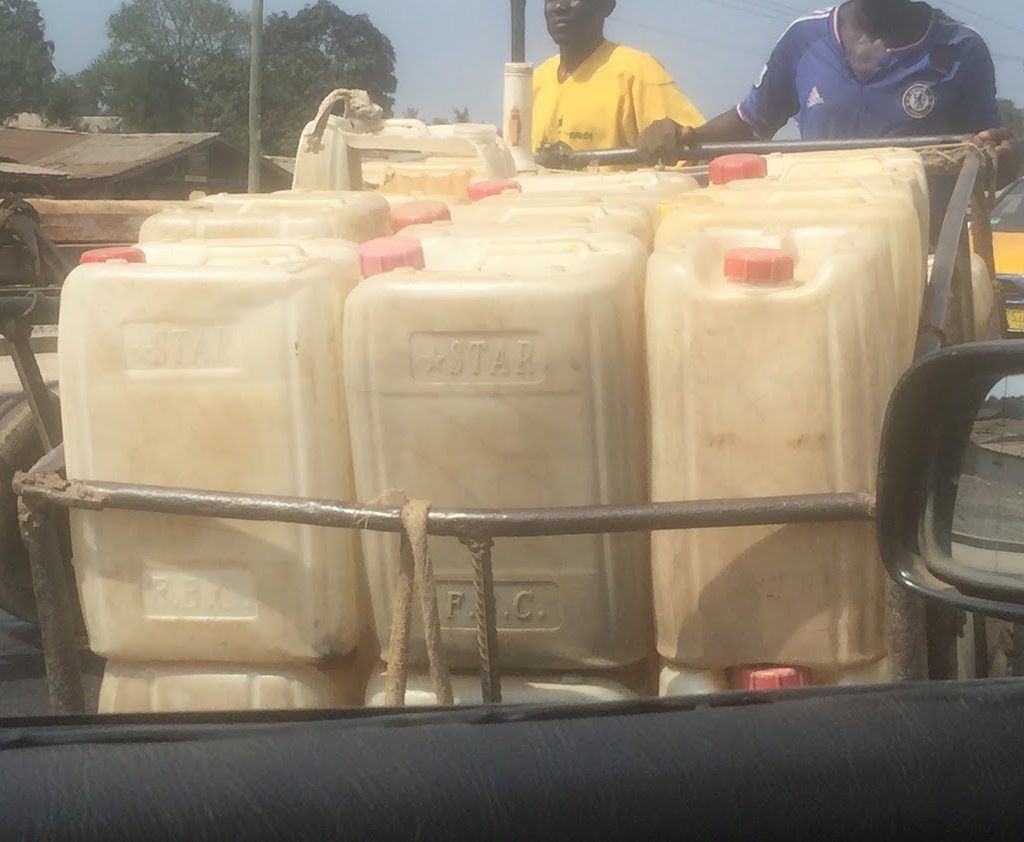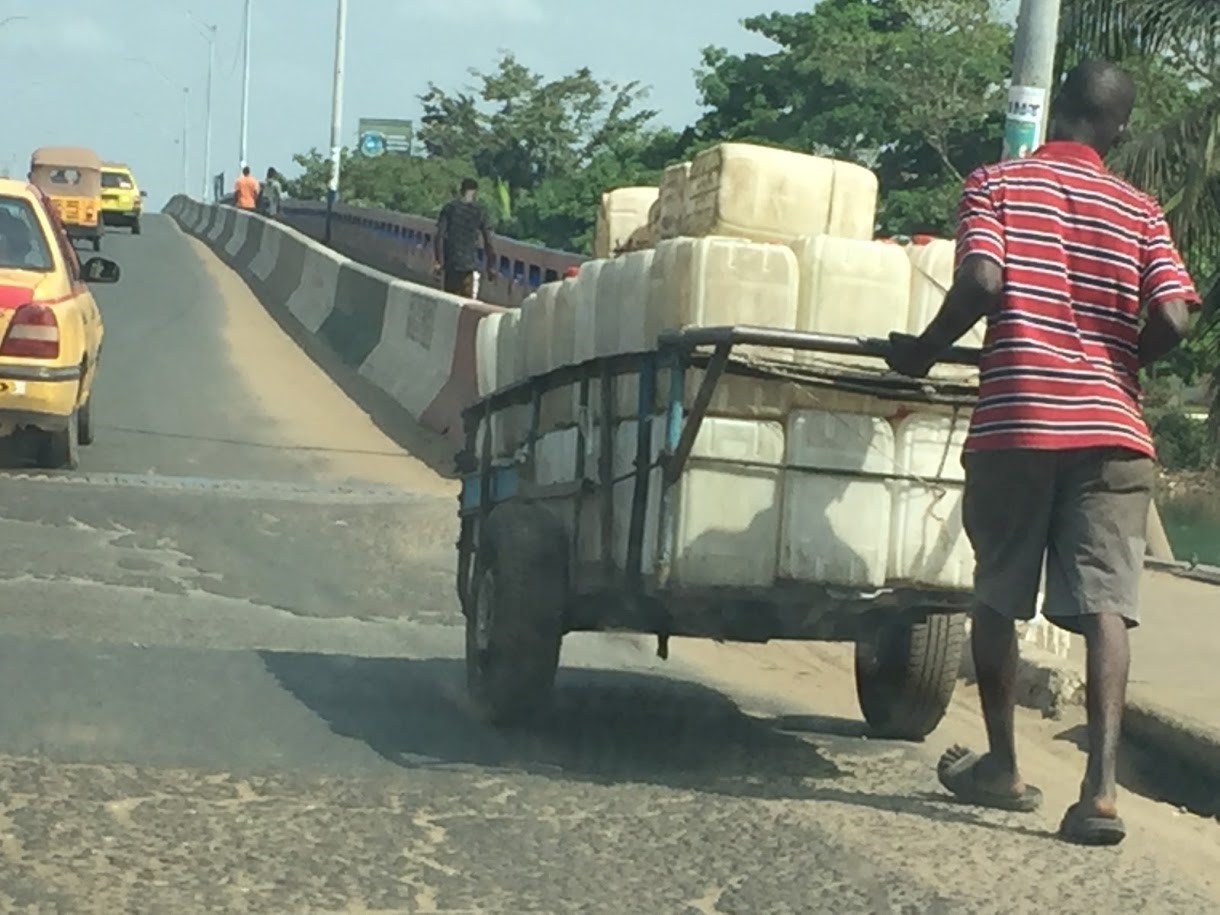Monrovia- In Liberia’s crowded capital, outdated water infrastructure struggles to meet growing demand as drought dries up wells across the city.
Now, residents of the city’s far-flung suburbs, often first to feel the effects of water shortages, demand action.
Monrovia- It is hot, and the waves of heat are visible. In this suburb, 40-year-old Famatta Ziah pushes a wheelbarrow full of empty plastic gallons. She’s heard there’s a well that still has water 20 minutes from where she stands.
Famatta is not alone. In Clara Town of estimated 2,000 households, other residents walk with buckets in search of water.
“We are suffering. When you wake up, you start to inquire about where you should go to get water. When you get a bucket, you must use it sparingly because it is hard to get,” says Famatta.

I was told that there is water nearby. However, it is only accessible for users who can afford a fee of 25 Liberian Dollars for a 20-litre gallon (below five-cent). In some cases, where you find a pump it’s 50 LD charged and 20 LD. The fee is based on the container you are carrying for water.
Famatta is not working and is depending on petty sales. The Liberia Water and Sewer is the government’s responsibility body to provide water for citizens.
August 2019, the Managing Director Duannah Kamara says all hands promised to restored pipe-borne water via the thirty _ six transmission line which supplies most parts of the city and its environs but there were no dates attached.
Famatta and others say the city council should ensure that water is at a less cost specifically as Liberia’s economic difficulties.
Famatta says many people, including her, get water from a river, which also contains sewage. She believes it has affected her family’s health specifically her grandchildren.
“We suffered from stomach pains and my grandchildren are always complaining of stomach pains, and I highly suspect it’s because of the water that we are getting, it is unsafe for our chores,” she says.
Clara Town, Gibraltar and Slipway are nearby communities of Liberia’ many suburbs that have not had a regular supply of water for years, either because the infrastructure is old or,
Some environments have boreholes, but they require electricity, and power cuts have made them unable to pump water and some have been damaged and need repairing.
Article 7 of the 1986 constitution states, “The Republic shall, consistent with the principles of individual freedom and social justice enshrined in this Constitution, manage the national economy and the natural resources of Liberia in such manner as shall ensure the maximum feasible participation of Liberian citizens under conditions of equality as to advance the general welfare of the Liberian people and the economic development of Liberia.”
Despite that most residents of communities have had to find water by digging their wells or handpumps.
However, because of an ongoing dry season, many wells have dried up and residents are left with few alternatives, and some have sought water from unsafe sources.
The Government of Liberia through the National Legislature in August 2016 passed into Law the National Water Supply and Sanitation Commission Act.
The Law seeks to ensure vibrant Water, Sanitation and Hygiene (WASH) sector supported by direct National Government and development partners’ investment which is critical to the rapid economic recovery, reconstruction and development of Liberia.
The Law recognizes that the economic and social development objectives of the people of Liberia shall be best achieved by a favourable and improved Water Supply and Sanitation Services (WSS).
At the same time, Liberia and the world have committed to being on track to reach the Sustainable Development Goal 6 (SDG 6): to ensure availability and sustainable management of sanitation and water for all by 2030.
According to the United Nations, today, 4.5 billion live without a safe toilet and 892 million people still practise open defecation.
SDG 6 aims to ensure that everyone has a safe toilet and that no-one practises open defecation by 2030. Failure to achieve this goal risks the entire 2030 Agenda for Sustainable Development.
UNICEF 2017 report states that low-lying areas of Liberia are prone to flooding, an issue compounded by the country’s ineffective water and sewage infrastructure, improper waste disposal, pollution and open defecation –conditions under which waterborne illnesses such as cholera and diarrhea thrive.
UNICEF Liberia said they responded to a flood emergency in the town of Unification in Margibi County (central) in April, which affected an estimated 3,000 persons and included the provision of Water Guard for household water treatment to 466 families (2,485 persons), and psychosocial support services to 28 children (18 girls, 10 boys).
Liberia Water and Sewer Corporation is still struggling to deal with its eroded pipes since the end of the civil crisis.
The Millennium Challenge Account Liberia (MCA-L) last year December signed a US$18 million agreement with the LWSC for the construction of major pipeline responsible to supply water to over one million customers in Monrovia and its environs.
On Wednesday, February 6, several urban communities begun hit by water shortage. Johnsonville, Paynesville, Congo Town, Sinkor, and Central Monrovia were all without supplies.
The LWSC confirmed the situation and said it was due to a “technical breakdown of its 36-inch transmission pipe” and that there will be a disruption of water supply to communities along the route.
The shortage was expected to last for about seven days, the agency said, noting that “only communities along the 36-inch transmission route will be affected.”
“LWSC regrets any inconvenience this disruption may cause the general public and its valued customers and assures the public that its technicians are working rapidly to restore the damaged 36-inch transmission pipe,” it said.
According to LWSC, technicians are working to repair the damaged 36-in transmission pipe that carries water to Paynesville, Congo Town, and Monrovia.
The LWSC is facing a reduction in its budget – from a US$1,557,336 allocation in 2016/2017 to 1,057,130 in 2017/2018. Currently, the agency has US$ 539,855.
It is unclear how the budget cut is impacting the agency’s performance.
In November
2019 Millennium Challenge Account _ Liberia ( MCA_L) and the Liberia Water And
Sewer Corporation ( LWSC) broke ground for the construction of a
US$18million new raw water intake from the dam of the Hydropower Plant to
the White Plains Water Treatment Plant.
The pipeline is part of the Energy project under the Millennium Challenge
Corporation ( MCC) Compact with Liberia through a grant of US$ 257m
provided by the United States of America to address the lack of access to
reliable and affordable electricity and adequate road infrastructure.
The pipeline project for which the Government of Liberia and the MCA_L broke
grounds according to the LWSC will deliver water from the dam using gravity
flow, saving the LWSC US $780,000 yearly in electricity costs to pump water to
the water treatment plant.
The LWSC said on its website said the project will improve the reliability and
quality of the water supply to the nearly one million residents of Greater
Monrovia.
The current pipes were constructed in 1957 and it has reportedly destroyed due to the Liberian civil conflict, a situation which now makes it difficult for LWSC to adequately supply Monrovia and its environs.
According to the 2017 UNICEF annual report, a nationwide water-point mapping exercise highlighted the scale of inequitable access to WASH facilities in south-eastern Liberia and in urban slums in Monrovia.
The report states that an estimated 58,000 people living in five communities of the capital’s most congested slums benefited from the extension of water supply systems and gender-and disability-friendly sanitation facilities, while 41,000 students benefited from improved water, sanitation, and hygiene (WASH) services and 39,000 benefited from better WASH systems in 10 healthcare facilities.
However, most Liberians still do not have access to running water, which is supplied to some neighborhoods by the LWSC.
Famatta and others just want a solution, “The government must find a way to fix this problem,” she says. “We do not know if the water sources no longer have water or not. They should at least fix our pipes so that we get water and put up more boreholes.” This story is done by SheWrites, SheLeads.

